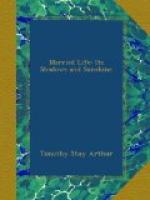“Friends?” said Kate, half to herself. “Friends? Have I any friends?”
“My child, why do you speak in this way?” asked her mother, in a voice half sorrowful, half reproving.
“Friends seek your good, not their own pleasure,” continued Kate. “Have I any who may be called by so excellent a name?”
And she shook her head mournfully.
“Have you not a husband?” said Mrs. Harrison.
Kate again shook her head; and then, after a pause, replied—
“There is a man who calls himself my husband; but he is so only in name.”
“Kate! Kate!” exclaimed her mother, “are you mad? How dare you utter such language?”
“A heart that is breaking, mother,” said the unhappy creature, “may be pardoned, if, in a moment of intense suffering, it is betrayed into an expression of pain.”
A long and gloomy silence followed this remark, which smote with the apparent force of a hammer upon the heart of Mrs. Harrison. No further attempt was made, at the time, to induce Kate to yield to the wishes of her friends. Her mother endeavoured, rather, to draw off her mind from thoughts such as those to which she had just given utterance. But, she was none the less deeply impressed with the belief that the change proposed would be beneficial; nor did she intend abandoning her efforts to induce her daughter to go from home for a short season. At the first opportunity she had an interview with Mr. Edwards, and held a conference with him on the subject of Kate’s mental disease. She found him rather reserved, and disinclined to much conversation on the subject. But, on pressing the matter upon him, he was more free to say what was in his mind. To her expressions of concern for Kate, he responded with much apparent earnestness; said that it gave him great concern, and that he was satisfied she could not live over a few years if some change did not take place.
“Since the birth of her child,” said he, “she has never regained her strength. That dangerous fever gave her system a terrible shock.”
“I’m afraid,” returned her mother, “that we erred in not permitting her to nurse her child—what she so earnestly desired to do. She cannot, it seems, get over that.”
“She has never said so to me.”
“But no later than yesterday she alluded to it while I talked with her, and in a way that satisfied me of her having taken the matter far more deeply to heart than I had imagined.”
“That is a weakness, as you must yourself see, Mrs. Harrison. Apart from considerations of health, I would not have my wife a mere wet nurse; and I am surprised that she should have thought of such a thing.”
“The desire was but a natural one,” replied Mrs. Harrison. As to there being any thing degrading in the act of a mother giving nourishment to her own babe, as some strangely enough seem to think, I cannot see it. I drank at my mother’s breast, and my child, in turn, drank at mine; and, I believe, it would have been far better for Kate at this moment if she had done the same for her own off-spring. In this matter, people are going against nature; and whenever this is done, evil of some kind must inevitably follow.”




